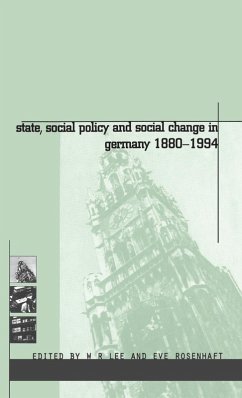Germany provides an interesting context in which to examine the interplay between state and society by reason of specific features of its history. This volume assesses the five different forms of state or types of political regime in the period 1880 to 1980.
This classic text -- thoroughly revised to take into account the effects of unification -- explores the relationship between state policy and social change in modern German history. Particular emphasis is placed on the Wilhelmine Empire (pre-1918), the Weimar Republic (1918-1933) and West Germany since 1945.Chapters address:- the social implications of industrial medicine since the 19th century;- official attitudes to the employment of female civil servants in the Weimar Republic;- public health in the Weimar Republic; and- the role of municipal finance in 20th-century economics and politics.This is an invaluable sourcebook for students and scholars looking for insights into current debates about German state policy, the preconditions for the rise of Nazism, and the evidence that the process of reunification provides for the character of the GDR and the future of the Federal Republic.
This classic text -- thoroughly revised to take into account the effects of unification -- explores the relationship between state policy and social change in modern German history. Particular emphasis is placed on the Wilhelmine Empire (pre-1918), the Weimar Republic (1918-1933) and West Germany since 1945.Chapters address:- the social implications of industrial medicine since the 19th century;- official attitudes to the employment of female civil servants in the Weimar Republic;- public health in the Weimar Republic; and- the role of municipal finance in 20th-century economics and politics.This is an invaluable sourcebook for students and scholars looking for insights into current debates about German state policy, the preconditions for the rise of Nazism, and the evidence that the process of reunification provides for the character of the GDR and the future of the Federal Republic.









